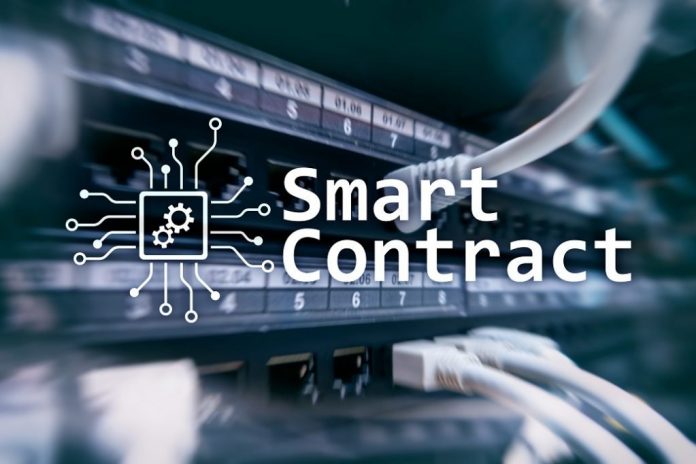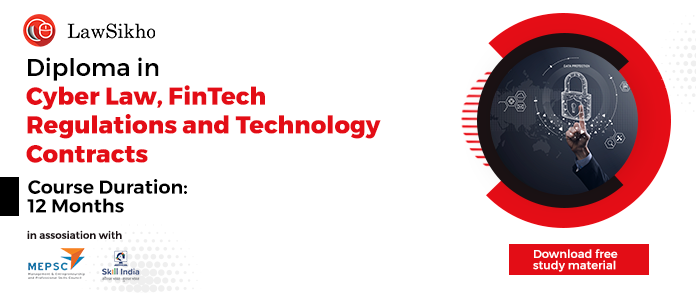This article is written by Komal Kamble. This article has been edited by Ojuswi (Associate, Lawsikho).
This article has been published by Sneha Mahawar.
Table of Contents
Introduction
Technology has always emerged to ease human work and automate the manual process. Smart Contract is one of the boons of blockchain technology in the field of contracts as it is proclaimed to be the future of traditional contracts by experts. It is aimed to automate the execution of contracts without any human interference. Although the use of blockchain technology has skyrocketed, it is still a complex subject for people who are not technically adept. This article will focus on explaining what smart contracts are, how are they executed, and their impact on today’s fast-moving world.
What is a smart contract
A smart contract is a computer program hosted and executed on the blockchain network. Each smart contract consists of code that specifies predetermined conditions that, when met, call the outcome. By running on a decentralised blockchain network instead of a centralised server, a smart contract allows multiple parties to achieve a shared result in an accurate, fast, and tamper-proof manner. A decentralised network means a network where data is stored on multiple nodes(computers) in a distributed fashion. Each node within the network functions as a separate authority with independent decision-making power regarding how it interacts with other systems. These networks also distribute processing power and workload functions among connected servers.
Let’s say Alice wants to buy a hoodie from an online seller but she is afraid to pay an unknown seller online, the seller can’t trust her and send her the product before receiving the money. This problem can be solved using a smart contract. A smart contract (or a crypto contract) is a computer program that executes when a set of predefined conditions defined in the contract are triggered. It is smart as the software runs automatically once the conditions are met.
How does smart contract work
Smart contracts work by following simple “if /when/, then” statements that are written into code on blockchain in a programming language called Solidity. Each node in the blockchain network checks the transactions to see if all parties have fulfilled the predetermined conditions, until then all parties will be held to the contract. If the network agrees that all conditions are true, the contract is executed automatically without any middleman. If the obligation is not fulfilled the amount is refunded to the parties to the contract.
How to execute a smart contract
Programming phase
The logic of the agreement (the terms, rules, and conditions) is determined by all parties. Once terms and conditions are established it is hardcoded on a blockchain platform. The contract becomes part of the public blockchain and is visible to all parties. All the parties have access to approve the contract.
Event trigger
The terms and conditions encrypted and stored in the blockchain network are the triggering events of the contract. When these predetermined conditions codified in the contract are fulfilled by all the parties to the contract or the contract has passed its deadline, the contract is triggered and gets automatically executed.
Execution
At execution, the terms coded into the contract automatically transfer values between relevant parties or refund the amounts depending upon completion or non-completion of the predetermined task.
Settlement
Once the contract is completed, the transfer of value between parties is recorded onto the blockchain ledgers. All the nodes (computers) in the blockchain update their ledger to show the updated state of the contract. These verified records cannot be altered.
Some of the top blockchain platforms on which smart contracts are hosted are Ethereum, BNB, Cardano, Solana, and Polkadot.
Why smart contracts are awesome
Accuracy and efficiency
One of the main requirements of smart contracts is the need to record all the terms and conditions in precise detail. This element is necessary since an omission can result in transaction errors. So, automated contracts try to avoid the pitfalls that are associated with manually filling out heaps of forms. Efficiency is the by-product of accuracy and speed.
Processing speed
Because Smart Contracts are digital, there is no paperwork to process and obligations are performed instantly. There is no third party involved to execute or settle the transaction.
Reliability
Smart Contracts are immutable, meaning once smart contracts are created, they can never be tampered with. The records of the transactions are visible to all participants. Hence, there is no need to question whether information has been altered for personal benefit.
Security
In blockchain transactions are encrypted, which makes them very difficult to hack. Moreover, each record is connected to previous and subsequent blocks of the data on a distributed ledger therefore hackers would have to change the entire chain to change a single record.
Cost efficiency
Smart Contracts remove the need for intermediaries to handle the transaction or complete the documentation to settle the contract. This eliminates the professional and operational fees associated with it.
Application of smart contracts
Smart Contracts are used across industries ranging from financial services to insurance to healthcare. Here are some examples where smart contracts are used in real life.
Government voting system
A centralized voting system faces numerous problems when it comes to tracking votes. For instance, manipulation of voters’ identities, manipulation in counting, and biased decision making. A smart contract is introduced to eliminate such malpractices. By making a smart contract, a unique digital identity for all the voters can be created. All votes are registered on the blockchain network and counted automatically without any third-party interference or dependency on a manual process. Every voter would get recorded on the ledger and that information cannot be modified. The records are transparently available on the public network for audit and verification.
Case history:
USA 2020 presidential elections were the first vote cast using blockchain technology. The voters had to vote through a blockchain-powered mobile application called VOATZ.
Insurance
One of the most use-cases of smart contracts is in the Insurance Industry. It is a known fact that most disputes happen in the insurance sector. Smart contracts will mainly be used to start automating underwriting, claims to handle, and pay-outs. Their impact on these processes can be significant, especially when they are used in conjunction with third-party oracles and artificial intelligence. In particular, automation will lead to higher efficiency as the speed of claims handling would increase, while the costs and possible human errors associated with manual processing are likely to reduce.
By automating pay-outs and ensuring that claims are paid following the terms of the contract, smart contracts enhance the trust between the parties since on the one hand, valid claims would be automatically processed and paid while on the other hand, the technology interconnected with the smart contract can facilitate targeted investigation and this would permit to detect and deny fraudulent claims more easily.
Example: Insurance companies like LEMONADE, and B3I use smart contracts and distributed ledger technology for executing insurance contracts. If the claims are approved these companies pay out the claim within 3 seconds using a blockchain network. Lemonade was voted #1 of 270 companies for customer satisfaction in renter’s insurance.
Crowdfunding
Conventional Crowdfunding involves the significant role of third-party intermediaries to collect the funds from the investors and transfer them to the product team on fulfilment of the project. Smart Contract eliminates the need for intermediaries as it is a fully automated process.
A smart contract can be programmed in a manner so that it holds all the received funds until a certain goal is reached. The investors of the project can transfer their funds to the smart contract. If the project gets fully funded, the contract automatically transfers the funds to the creator of the project. And if the project fails to meet the goals, the funds automatically go back to the investors.
Case history:
One of the blockchain-based crowdfunding platforms is CRYPSTARTER. Cryptstarter creates a co-investment system that includes an investment relationship between Startups – Lead Investors – Retail investors. The difference between Cryptstarter is that it allows Startups to issue Cryptocurrencies for their own project based on its Blockchain and managed by a fully-featured Smart contract like the Ethereum network.
Defi app
Decentralized finance also called Defi in short form is an exit from traditional banking services and norms. Defi apps were introduced to focus on disrupting financial intermediaries while allowing users to perform various financial functions in a more open, interoperable, and transparent manner.
For instance, Robin and Ross want to perform a transactional duty where Robin pays Ross for a business deal. The smart contract is predefined that Robin should remit a certain amount of funds, say $X, to Ross if he fulfils a bargain. On the contrary, if Ross fails, the smart contract should automatically reverse the fund to Robin.
Limitations of smart contract
While there are numerous benefits to adopting Smart Contracts, the following are some of the obstacles and restrictions associated with smart contracts:
Speed and scalability
Smart contracts are deployed on blockchain platforms such as Ethereum. Therefore, the speed of execution of the transaction depends on the blockchain. For instance, Ethereum does 13 transactions per second. This rigorously limits the number of transactions that the network can process in any given second.
Immutable
Smart Contracts are tamper-proof meaning if there is a problem with the contract, it can be difficult or impossible to fix.
Technical challenges
Auditing a smart contract requires technical proficiency which falls short in common investors and end-users. This lack of knowledge leads to imprudent investment, which might lead to insecure smart contracts, allowing hackers to steal millions of dollars.
Legal enforcement
Smart Contracts by their very nature were introduced to eliminate intermediaries. If a contract works like they are supposed to, then the users do not have to go to court for settlement. In case of disputes, these contracts are not legally enforceable in all countries.
Conclusion
Smart Contracts are proved to be useful when we want definite commitments and there is no ambiguity in the terms of the contract. In the current time, people want a contracts system that has the flexibility to adapt to any changes in the contract, speedy execution, automated process, and assured security at the same time. Although smart contracts prove to be true in major aspects, some of them fall under the technical restrictions of the blockchain network.
People across the world are excited about the prospects smart contracts will provide us to ease the transactional process. While blockchain experts claim that smart contracts are the way to the future, there are numerous legal and practical issues to be entangled.
Let us adopt the up-gradation in the course of contracts with open hands and see how it can work more efficiently in the future by the end-user.
References
- https://blockgeeks.com/guides/smart-contracts/#Unfolding_the_Future_of_Smart_Contracts
- https://chainlinktoday.com/ethereum-co-founder-vitalik-buterin-on-why-smart-contracts-need-oracles/
- https://knowledge.wharton.upenn.edu/article/what-are-smart-contracts/
Students of Lawsikho courses regularly produce writing assignments and work on practical exercises as a part of their coursework and develop themselves in real-life practical skills.
LawSikho has created a telegram group for exchanging legal knowledge, referrals, and various opportunities. You can click on this link and join:
Follow us on Instagram and subscribe to our YouTube channel for more amazing legal content.
 Serato DJ Crack 2025Serato DJ PRO Crack
Serato DJ Crack 2025Serato DJ PRO Crack













 Allow notifications
Allow notifications


